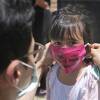Respiratory syncytial virus, commonly known by its acronym RSV, has been wreaking havoc this autumn. Hospitals are struggling with strained capacity as cases of the virus surged earlier than average, more children are getting seriously ill, and health care professionals are worried about a “ triple epidemic” with RSV seasons overlapping with the flu and COVID-19.
The factors that led to this circumstance are something of a perfect storm, Dr. Katherine Gergen Barnett told Boston Public Radio. And many of those factors stem from the COVID-19 pandemic, which still strains the health care system on both the staffing and patient sides.
Before the pandemic, she said, most children would get RSV at some point before they turned 3 years old. Now young children are getting sick with RSV as well as older children who had limited exposure to the virus when public health measures, like masking, were implemented during the pandemic. Gergern Barnett said doctors are noticing a similar trend with the flu: People have weaker immune systems because of decreased exposure, so the virus is spreading differently than it has in the past.
“[Both the flu and RSV have] come about a month earlier than we're used to seeing,” she said. “So actually, our whole ecosystem is different right now in terms of how quickly are viruses spreading, and ... our immune systems are down, particularly with kids.”
On the other side of the issue, fallout from the COVID-19 pandemic has also impacted health care availability, particularly issues like a lack of staffing and a loss of beds.
"We've had two-plus years of stress [on] a hospital system," she said. "And if people remember, in the early days of the pandemic, because kids weren't affected as much by COVID-19 and weren't being hospitalized, a lot of those pediatric beds were actually deployed to adults."
Not all of those beds have been reallocated back to pediatric patients. In addition, Gergen Barnett says there's been a "huge exodus" of nurses and nurse practictioners. Those staffing issues stem from the pandemic as well, from burnout pushing many away from hospital work to economic motivations pulling people toward traveling nurse positions.
“You're seeing not having enough capacity in terms of beds, you're seeing not enough capacity in terms of people caring for the children,” she said.
But there is some light at the end of the tunnel: Despite the spike in cases, the vast majority of children who get sick with RSV will not need to be hospitalized, and can receive effective outpatient treatment.
“Between 2% to 5% of kids — maximum 5% — need to go to the emergency room at all. So just remember that the vast majority of kids who get RSV and older people who get RSV will not need to go," she explained. "There's a lot of things that we can be doing to take care of your children without having them go to the emergency room.”







